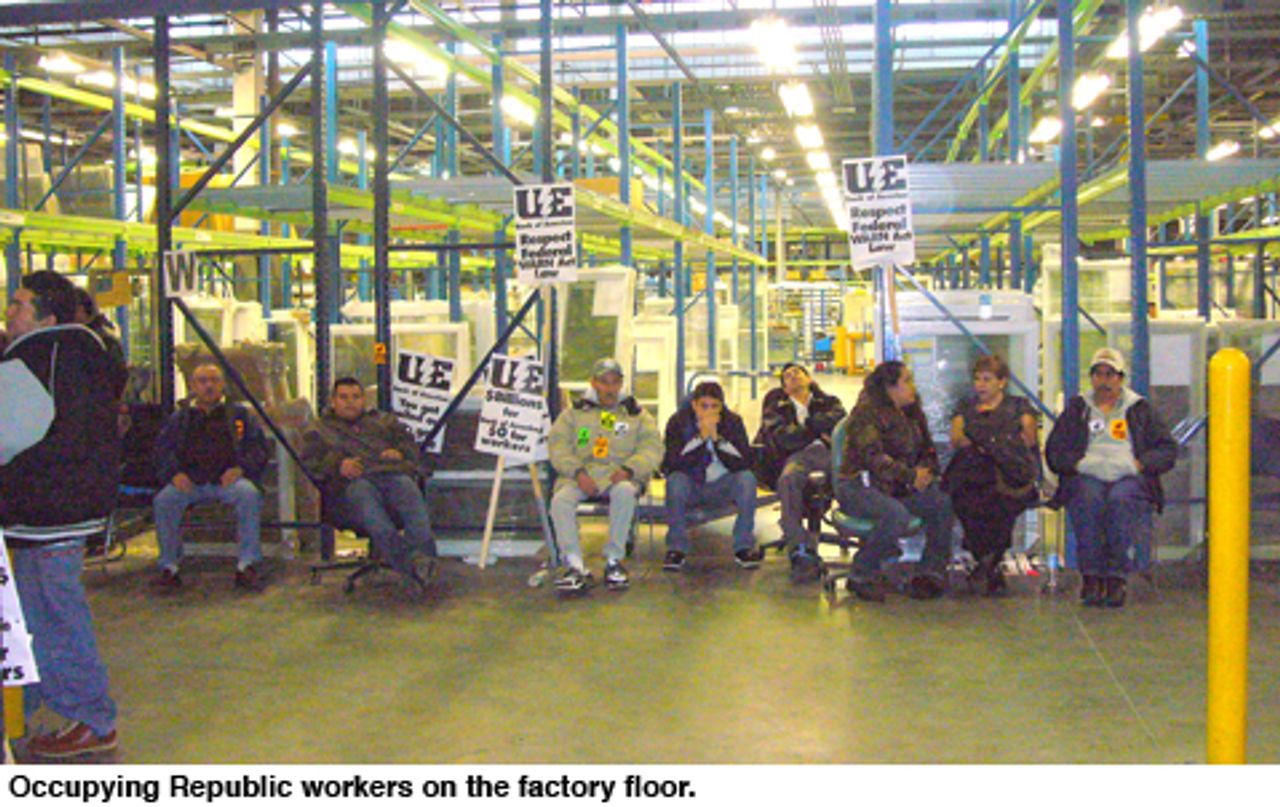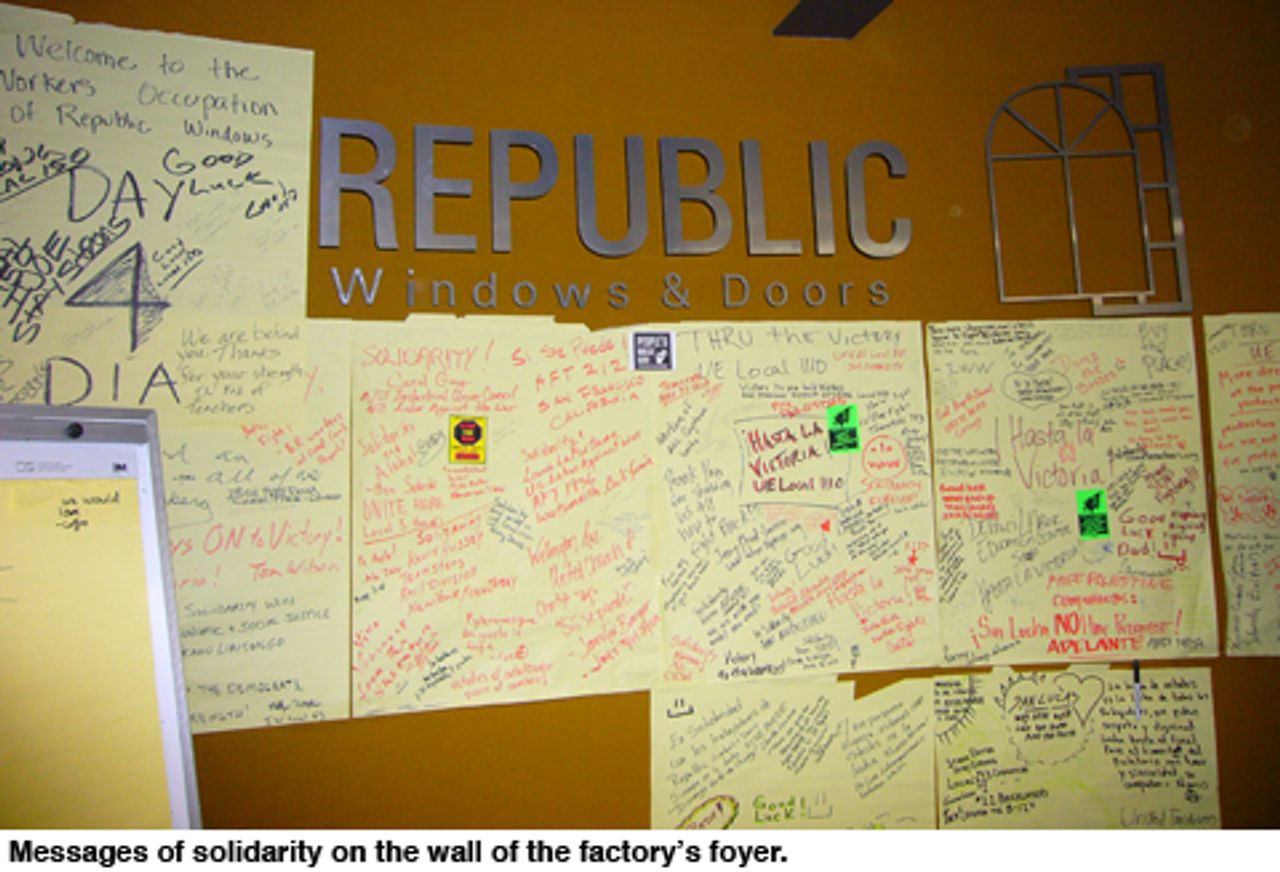Laid-off workers occupy Chicago factory, demand severance
Associated Press — 12/07/2008 11:40 am
CHICAGO -- Workers who got three days' notice that their factory was shutting its doors have occupied the building and say they won't go home without assurances they'll get severance and vacation pay.
About 250 union workers occupied the Republic Windows and Doors plant in shifts Saturday while union leaders outside criticized a Wall Street bailout they say is leaving laborers behind.
Leah Fried, an organizer with the United Electrical Workers, said the Chicago-based vinyl window manufacturer failed to give 60 days' notice required by law before shutting down.
During the two-day peaceful takeover, workers have been shoveling snow and cleaning the building, Fried said.
"We're doing something we haven't done since the 1930s, so we're trying to make it work," she said, referring to a tactic most famously used in 1936-37 by General Motors factory workers in Flint, Michigan, to help unionize the U.S. auto industry.
Fried said the company can't pay its 300 employees because its creditor, Charlotte, North Carolina-based Bank of America, won't let them. Crain's Chicago Business reported that Republic Windows' monthly sales had fallen to $2.9 million from $4 million during the past month. In a memo to the union, obtained by the business journal, Republic CEO Rich Gillman said the company had "no choice but to shut our doors."
Bank of America received $25 billion from the government's financial bailout package. The company said in a statement Saturday that it isn't responsible for Republic's financial obligations to its employees.
"Across cultures, religions, union and nonunion, we all say this bailout was a shame," said Richard Berg, president of Teamsters Local 743. "If this bailout should go to anything, it should go to the workers of this country."
Outside the plant, protesters wore stickers and carried signs that said, "You got bailed out, we got sold out."
The Chicago-based Rainbow PUSH Coalition, a civil rights group, announced in a news release Saturday that civil rights leader Jesse Jackson planned to visit the workers Sunday morning to offer his support.
Larry Spivack, regional director for American Federation of State, County and Municipal Employees, Council 31, said the peaceful action will add to Chicago's rich history in the labor movement, which includes the 1886 Haymarket affair, when Chicago laborers and anarchists gathering in a square on the city's west side drew national attention after an unidentified person threw a bomb at police.
"The history of workers is built on issues like this here today," Spivack said.
Representatives of Republic Windows did not immediately respond Saturday to calls and e-mails seeking comment.
Police spokeswoman Laura Kubiak said authorities were aware of the situation and officers were patrolling the area.
Workers were angered when company officials didn't show up for a meeting Friday that had been arranged by U.S. Rep. Luis Gutierrez, a Chicago Democrat, Fried said. Union officials said another meeting with the company is scheduled for Monday afternoon.
"We're going to stay here until we win justice," said Blanca Funes, 55, of Chicago, after occupying the building for several hours. Speaking in Spanish, Funes said she fears losing her home without the wages she feels she's owed. A 13-year employee of Republic, she estimated her family can make do for three months without her paycheck. Most of the factory's workers are Hispanic.
Associated Press — 12/07/2008 11:40 am
CHICAGO -- Workers who got three days' notice that their factory was shutting its doors have occupied the building and say they won't go home without assurances they'll get severance and vacation pay.
About 250 union workers occupied the Republic Windows and Doors plant in shifts Saturday while union leaders outside criticized a Wall Street bailout they say is leaving laborers behind.
Leah Fried, an organizer with the United Electrical Workers, said the Chicago-based vinyl window manufacturer failed to give 60 days' notice required by law before shutting down.
During the two-day peaceful takeover, workers have been shoveling snow and cleaning the building, Fried said.
"We're doing something we haven't done since the 1930s, so we're trying to make it work," she said, referring to a tactic most famously used in 1936-37 by General Motors factory workers in Flint, Michigan, to help unionize the U.S. auto industry.
Fried said the company can't pay its 300 employees because its creditor, Charlotte, North Carolina-based Bank of America, won't let them. Crain's Chicago Business reported that Republic Windows' monthly sales had fallen to $2.9 million from $4 million during the past month. In a memo to the union, obtained by the business journal, Republic CEO Rich Gillman said the company had "no choice but to shut our doors."
Bank of America received $25 billion from the government's financial bailout package. The company said in a statement Saturday that it isn't responsible for Republic's financial obligations to its employees.
"Across cultures, religions, union and nonunion, we all say this bailout was a shame," said Richard Berg, president of Teamsters Local 743. "If this bailout should go to anything, it should go to the workers of this country."
Outside the plant, protesters wore stickers and carried signs that said, "You got bailed out, we got sold out."
The Chicago-based Rainbow PUSH Coalition, a civil rights group, announced in a news release Saturday that civil rights leader Jesse Jackson planned to visit the workers Sunday morning to offer his support.
Larry Spivack, regional director for American Federation of State, County and Municipal Employees, Council 31, said the peaceful action will add to Chicago's rich history in the labor movement, which includes the 1886 Haymarket affair, when Chicago laborers and anarchists gathering in a square on the city's west side drew national attention after an unidentified person threw a bomb at police.
"The history of workers is built on issues like this here today," Spivack said.
Representatives of Republic Windows did not immediately respond Saturday to calls and e-mails seeking comment.
Police spokeswoman Laura Kubiak said authorities were aware of the situation and officers were patrolling the area.
Workers were angered when company officials didn't show up for a meeting Friday that had been arranged by U.S. Rep. Luis Gutierrez, a Chicago Democrat, Fried said. Union officials said another meeting with the company is scheduled for Monday afternoon.
"We're going to stay here until we win justice," said Blanca Funes, 55, of Chicago, after occupying the building for several hours. Speaking in Spanish, Funes said she fears losing her home without the wages she feels she's owed. A 13-year employee of Republic, she estimated her family can make do for three months without her paycheck. Most of the factory's workers are Hispanic.



